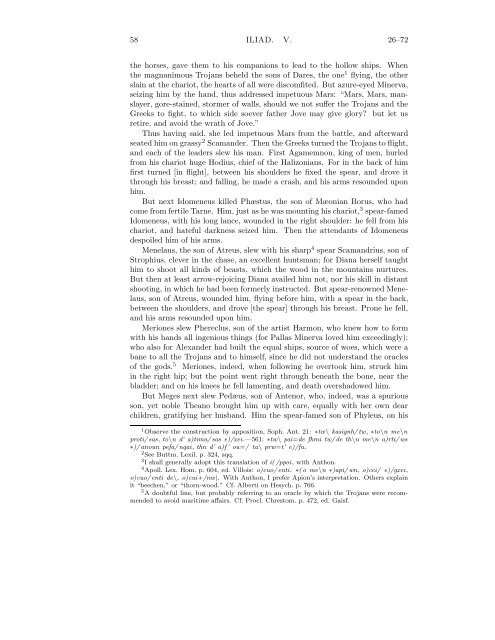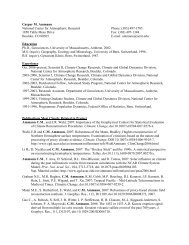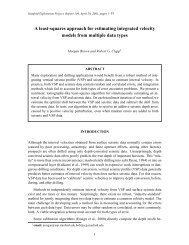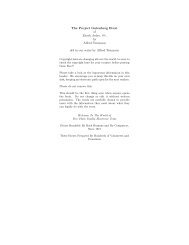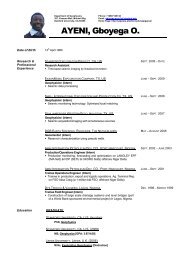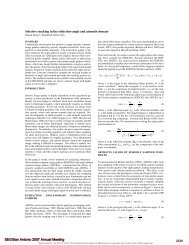The Project Gutenberg Etext of the Iliad of - Stanford Exploration ...
The Project Gutenberg Etext of the Iliad of - Stanford Exploration ...
The Project Gutenberg Etext of the Iliad of - Stanford Exploration ...
Create successful ePaper yourself
Turn your PDF publications into a flip-book with our unique Google optimized e-Paper software.
58 ILIAD. V. 26–72<br />
<strong>the</strong> horses, gave <strong>the</strong>m to his companions to lead to <strong>the</strong> hollow ships. When<br />
<strong>the</strong> magnanimous Trojans beheld <strong>the</strong> sons <strong>of</strong> Dares, <strong>the</strong> one 1 flying, <strong>the</strong> o<strong>the</strong>r<br />
slain at <strong>the</strong> chariot, <strong>the</strong> hearts <strong>of</strong> all were discomfited. But azure-eyed Minerva,<br />
seizing him by <strong>the</strong> hand, thus addressed impetuous Mars: “Mars, Mars, manslayer,<br />
gore-stained, stormer <strong>of</strong> walls, should we not suffer <strong>the</strong> Trojans and <strong>the</strong><br />
Greeks to fight, to which side soever fa<strong>the</strong>r Jove may give glory? but let us<br />
retire, and avoid <strong>the</strong> wrath <strong>of</strong> Jove.”<br />
Thus having said, she led impetuous Mars from <strong>the</strong> battle, and afterward<br />
seated him on grassy 2 Scamander. <strong>The</strong>n <strong>the</strong> Greeks turned <strong>the</strong> Trojans to flight,<br />
and each <strong>of</strong> <strong>the</strong> leaders slew his man. First Agamemnon, king <strong>of</strong> men, hurled<br />
from his chariot huge Hodius, chief <strong>of</strong> <strong>the</strong> Halizonians. For in <strong>the</strong> back <strong>of</strong> him<br />
first turned [in flight], between his shoulders he fixed <strong>the</strong> spear, and drove it<br />
through his breast; and falling, he made a crash, and his arms resounded upon<br />
him.<br />
But next Idomeneus killed Phæstus, <strong>the</strong> son <strong>of</strong> Mæonian Borus, who had<br />
come from fertile Tarne. Him, just as he was mounting his chariot, 3 spear-famed<br />
Idomeneus, with his long lance, wounded in <strong>the</strong> right shoulder: he fell from his<br />
chariot, and hateful darkness seized him. <strong>The</strong>n <strong>the</strong> attendants <strong>of</strong> Idomeneus<br />
despoiled him <strong>of</strong> his arms.<br />
Menelaus, <strong>the</strong> son <strong>of</strong> Atreus, slew with his sharp 4 spear Scamandrius, son <strong>of</strong><br />
Strophius, clever in <strong>the</strong> chase, an excellent huntsman; for Diana herself taught<br />
him to shoot all kinds <strong>of</strong> beasts, which <strong>the</strong> wood in <strong>the</strong> mountains nurtures.<br />
But <strong>the</strong>n at least arrow-rejoicing Diana availed him not, nor his skill in distant<br />
shooting, in which he had been formerly instructed. But spear-renowned Menelaus,<br />
son <strong>of</strong> Atreus, wounded him, flying before him, with a spear in <strong>the</strong> back,<br />
between <strong>the</strong> shoulders, and drove [<strong>the</strong> spear] through his breast. Prone he fell,<br />
and his arms resounded upon him.<br />
Meriones slew Phereclus, son <strong>of</strong> <strong>the</strong> artist Harmon, who knew how to form<br />
with his hands all ingenious things (for Pallas Minerva loved him exceedingly):<br />
who also for Alexander had built <strong>the</strong> equal ships, source <strong>of</strong> woes, which were a<br />
bane to all <strong>the</strong> Trojans and to himself, since he did not understand <strong>the</strong> oracles<br />
<strong>of</strong> <strong>the</strong> gods. 5 Meriones, indeed, when following he overtook him, struck him<br />
in <strong>the</strong> right hip; but <strong>the</strong> point went right through beneath <strong>the</strong> bone, near <strong>the</strong><br />
bladder; and on his knees he fell lamenting, and death overshadowed him.<br />
But Meges next slew Pedæus, son <strong>of</strong> Antenor, who, indeed, was a spurious<br />
son, yet noble <strong>The</strong>ano brought him up with care, equally with her own dear<br />
children, gratifying her husband. Him <strong>the</strong> spear-famed son <strong>of</strong> Phyleus, on his<br />
1 Observe <strong>the</strong> construction by apposition, Soph. Ant. 21: ∗tw\ kasignh/ tw, ∗to\n me\n<br />
proti/ sas, to\n d’a)tima/ sas e)/xei.—561: ∗tw\ pai=de fhmi tw/ de th\n me\na)rti/ws<br />
∗)/ anoun pefa/ nqai, thn d’ a)f’ ou=/ ta\ prw=t’ e)/fu.<br />
2 See Buttm. Lexil. p. 324, sqq.<br />
3 I shall generally adopt this translation <strong>of</strong> i( /ppoi, with Anthon.<br />
4 Apoll. Lex. Hom. p. 604, ed. Villois: o)cuo/ enti. ∗(o me\n ∗)api/ wn, o)cei/ e)/gxei,<br />
o)cuo/ enti de\, o)cui+/nw|. With Anthon, I prefer Apion’s interpretation. O<strong>the</strong>rs explain<br />
it “beechen,” or “thorn-wood.” Cf. Alberti on Hesych. p. 766.<br />
5 A doubtful line, but probably referring to an oracle by which <strong>the</strong> Trojans were recommended<br />
to avoid maritime affairs. Cf. Procl. Chrestom. p. 472, ed. Gaisf.


